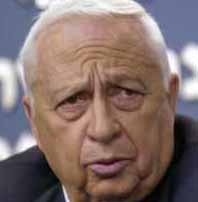
|

|
|
|
Jewish World Review June 25, 2002 / 15 Tamuz, 5762
 |
http://www.jewishworldreview.com |
President Bush's call yesterday for "a new and different Palestinian leadership" resolved an 18-month battle within his administration on whether to break with one of the basic tenets of U.S. Middle East policy for over a decade.
Ironically it was Bush's father who arranged the 1991 peace conference in Madrid that led to formal U.S. recognition of Yasser Arafat as the leader of the Palestinian people -- a recognition the current president called into question Monday.
And it was the intense diplomacy between Israeli leaders, Arafat and U.S. diplomats following the Madrid summit that led to Arafat's historic letters of understanding in 1993 with then-Prime Minister Yitzhak Rabin in which the Palestinian leader committed himself to forsaking terrorism in exchange for negotiations leading to an independent Palestinian state.
Now nearly 10 years after the Oslo agreements, Bush has determined that Arafat no longer is capable or willing to stick to that agreement. "Peace requires a new and different Palestinian leadership so that a Palestinian state can be born. I call on the Palestinian people to elect new leaders, leaders not compromised by terror," he declared in his long-awaited statement on the U.S. position on the Middle East.
This statement is contrary to the advice of Secretary of State Colin Powell and Powell's assistant secretary of state for Near East Affairs, William Burns.
Powell was strongly advocating more intensive re-engagement with Arafat as well as an international peace conference to endorse the establishment of an interim Palestinian state.
Earlier this month, the State Department approached the Turkish ambassador to Washington to enquire if his country was willing to host such a conference, and the result from Ankara was positive.
Burns returned this month from a visit to the Palestinian Authority and concluded that Arafat could deliver a cease-fire if the United States helped rebuild Palestinian jails, operations centers and listening posts and Israel delivered a freeze on building settlements. In intensive discussions over the last two weeks, Burns and Powell argued these matters with national security adviser Condoleezza Rice, Vice President Dick Cheney and Defense Secretary Donald Rumsfeld, according to administration sources.
Cheney, Rice and Rumsfeld agreed in varying degrees with the assessment of Israeli Prime Minister Ariel Sharon, who has deemed Arafat irrelevant and refused to negotiate with him. Indeed, following the terror attacks of Sept. 11 on New York and Washington, Sharon told his Israeli journalists, "Arafat is our bin-Laden."
Initially the speech was scheduled to be delivered June 20, but a string of suicide bombings last week, compounded by the State Department's strongly differing view, postponed the speech to Monday.
In many ways the president's new policy is a vindication of Israel's Deputy Prime Minister Natan Sharansky, who left Prime Minister Ehud Barak's government on the eve of the July 2000 Camp David peace summit on the grounds that Arafat's word could not be trusted.
Bush's speech yesterday echoed Sharansky's call for democratic reforms inside the Palestinian Authority as a precondition for ending terror. Calling for new and democratic political and economic institutions, Bush said: "The Palestinian state will never be created by terror. It will be built through reform, and reform must be more than cosmetic change or veiled attempt to preserve the status quo."
Sharansky over the last year and a half has been a key intermediary between Sharon's government and the White House. In December 2000, he told Israeli television that the new administration would take a hands-off approach to the Middle East conflict following a meeting with incoming Vice President Cheney.
Six weeks later, U.S. diplomats in the Middle East were instructed to drop the term "peace process" from their official discussions with foreign leaders. Indeed, no American officials were present at the peace talks in Taba, Egypt where Palestinian and Israeli negotiators came as close as they ever have to negotiating a final settlement to the conflict in the first week of Bush's administration in January 2001.
Sharansky's quiet persistence continued. In April this year he met with Rice while he was in Washington for a pro-Israel rally. In that meeting, which coincided with Powell's visit to Jerusalem and Ramallah, Sharansky pressed Rice to condition aid to rebuild the Palestinian Authority on democratic reforms.
Meanwhile, Powell announced that he favored a regional conference in the summer to negotiate the end of the intifada -- or struggle -- and announced the U.S. intention to rebuild Palestinian infrastructure destroyed in Israeli responses to suicide bombings.
But Sharansky's lobbying paid off and in early May Bush, after a meeting with Sharon, outlined a new policy to press Arafat for such changes. At the same time, the White House also privately ordered the State Department to begin seeking out new moderate, alternative Palestinian leadership.
Arafat responded to the pressure by announcing his intention to hold elections in
May, but never set a date. He also signed a slate of reforms passed by his legislative assembly calling for basic civil rights protections. On Monday, Arafat placed Sheikh Ahmed Yassin, the founder and the spiritual leader of Islamic militant movement Hamas, under house arrest.
With the president seeming to condition the recognition of a Palestinian state on Arafat's removal, a number of questions remain for U.S. policy, starting with whether Arafat will still be officially recognized as the leader of the Palestinian Authority.
On Monday, State Department officials did not know the answer to that question. "It's not like we are changing our phone numbers," one senior State Department official said. "We have contact with a wide range of officials within the Palestinian Authority. This is not necessarily Arafat."
Enjoy this writer's work? Why not sign-up for the daily JWR update. It's free. Just click here.
By Eli J. Lake
Eli J. Lake is UPI's State Department Correspondent.
Comment by clicking here.
